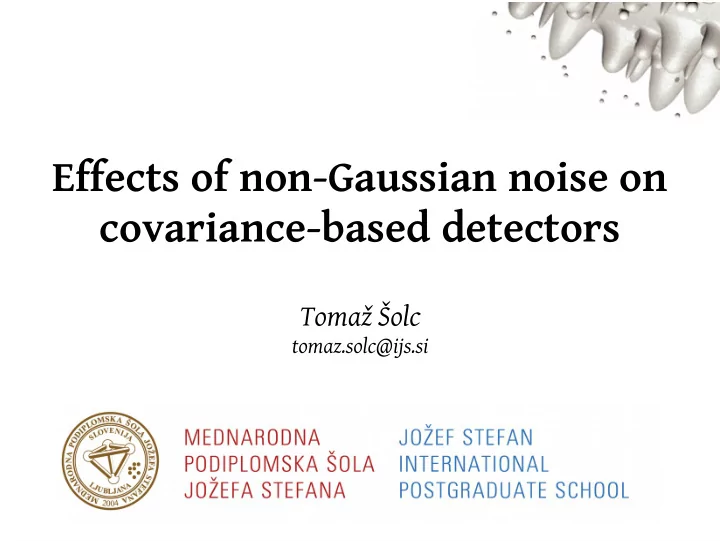

Effects of non-Gaussian noise on covariance-based detectors Tomaž Šolc tomaz.solc@ijs.si
Introduction ● All radio receivers exhibit additive noise ● Johnson-Nyquist (thermal) noise, signal crosstalk, etc. ● Random (Gaussan, non-Gaussian) and deterministic ● Typically only total noise power is considered in design (i.e. noise figure) ● Spectrum sensing and occupancy detection ● Several popular methods (CBD, EBD, cyclostationary, ...) exploit sample covariance for detection of weak signals. ● Based on assumption that noise samples are i.i.d. ● Statistical properties of receiver noise become important as well as total added power.
Motivation simulation experiment
Working hypothesis ● Bad CBD performance in experiment compared to simulated ideal case is due to non-Gaussian noise. Digital down-conversion + Periodic spurious signals =
Goals ● Estimate the effect of non-Gaussian receiver noise ● on CAV, MAC (covariance-based) detectors ● metric of detector performance: P in-min @ fixed P fa , P d ● detected signal: IEEE wireless microphone signal test vector ● Considered sources of non-Gaussian noise ● Clock or other constant-wave signal cross-talk, ● thermal noise, shaped by digital down-conversion. ● Determine basic guidelines for receiver design ● What is the best compromise between non-Gaussian and Gaussian noise?
Covariance-based detector (CBD) x 0 x 1 x 2 x Ns-1 ... x 0 x 1 x 2 x Ns-1 L ... ZENG , Y., AND LIANG , Y. C. Spectrum-Sensing Algorithms for Cognitive Radio Based on Statistical Covariances. In IEEE Transactions on Vehicular Technology (2009), vol. 58, pp. 1804–1815.
Covariance-based detector (CBD) ● CAV MAC ● Calculate a test statistic γ = γ ( R ) from covariance matrix. ● Based on P fa , determine γ 0 . ● Channel is occupied if γ > γ 0 . ZENG , Y., AND LIANG , Y. C. Robust spectrum sensing in cognitive radio. In IEEE International Symposium on Personal, Indoor and Mobile Radio Communications Workshops (2010), IEEE, pp. 1–8.
Test signal ● tone-modulated FM carrier ● “soft speaker” IEEE wireless microphone signal test vector C LANTON , C., KENKEL , M., AND TANG , Y. Wireless Microphone Signal Simulation Method. IEEE 802.22-07/0124r0, 2007.
Simulation setup ● Using Python 2.7 ● numpy and scipy numerical functions ● multiprocessing for creating a process pool ● PRNG – numpy.random.normal() ● Mersenne Twister (uniform distribution) ● normal PDF obtained through Box-Muller transform ROY, J.-S. ET AL. python-numpy-1.6.2/numpy/random/mtrand/randomkit.c
Simulated impairments ● Periodic (cosine) signal at various frequencies ● 3 f s /8, f s /4 + 1 kHz, f s /4, f s /8, f s /32, f s /128 ● Model for crosstalk of a clock signal in the circuit ● Simulated ADC oversampling and decimation (DDC) ● Adjusted N s , f s – decimation factors 1, 2 ... 8 ● Adjusted σ w (to keep noise power constant after DDC) ● scipy.signal.decimate() was used (8th order Chebyshev filter) ● Model for digital down-conversion in digital front-end ● Null
Validation ● Check if random samples are uncorrelated ● Check if energy detection results agree with analytical calculation
Results – periodic spurious ● Performance degrades much faster than with ED. ● Anomalous performance when signal frequency is at or near spurious frequency. ● MAC detector slightly more resistant than CAV
Results – periodic spurious
Results - oversampling ● Causes 3 to 5 dB increase in minimal detectable signal power regardless of k. ● CAV detector performs better than MAC.
Conclusions ● Periodic spurious signals significantly affect CBD ● Only become negligible when below -30 dB compared to Gaussian noise. ● Performance is decreased even when f n << f s ● Create inconsistent detection depending on signal frequency. ● Oversampling also affects CBD, but to a lesser degree ● Might be corrected using a prewhitening technique. ● Still most likely a net gain in practice due to reduced total noise power.
Questions? Tomaž Šolc tomaz.solc@ijs.si
Recommend
More recommend